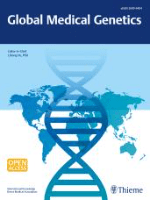
European Journal of Medical Genetics
Scope & Guideline
Unlocking Genetic Secrets for Better Health Outcomes
Introduction
Aims and Scopes
- Genetic Disorders and Syndromes:
The journal extensively covers a wide range of genetic disorders, including rare diseases, syndromes, and chromosomal abnormalities, providing insights into their clinical presentations, genetic underpinnings, and management strategies. - Clinical Genetics and Genomic Medicine:
A significant focus is placed on clinical genetics, including the application of genomic technologies such as next-generation sequencing (NGS) in diagnosing genetic conditions, evaluating variants of uncertain significance, and exploring genotype-phenotype correlations. - Patient-Centered Research and Healthcare:
Research that emphasizes patient experiences, clinical outcomes, and quality of life for individuals with genetic disorders is a core area, highlighting the importance of patient perspectives in genetic counseling and treatment. - Ethics and Policy in Genetic Testing:
The journal addresses ethical considerations in genetic testing, including informed consent, disclosure of genetic risks, and the implications of genetic information on family dynamics and healthcare practices. - Emerging Genetic Technologies and Therapies:
The European Journal of Medical Genetics also explores novel genetic therapies and diagnostic technologies, emphasizing their potential impact on patient care and the future of personalized medicine.
Trending and Emerging
- Integration of Genomic Technologies:
There is a growing emphasis on the application of advanced genomic technologies, such as NGS and whole-genome sequencing, in clinical settings to improve diagnostic accuracy and facilitate personalized treatment plans. - Focus on Rare Genetic Disorders:
An increasing number of studies are dedicated to rare genetic disorders, which often lack sufficient research and understanding, thereby addressing a critical gap in the field of medical genetics. - Patient-Centric Research:
Research that prioritizes patient perspectives, experiences, and outcomes is on the rise, reflecting a shift towards more holistic approaches in managing genetic conditions and enhancing the quality of care. - Ethical and Social Implications of Genetic Testing:
As genetic testing becomes more prevalent, there is an emerging focus on the ethical, social, and psychological implications of test results, including issues related to consent, privacy, and familial relationships. - Telemedicine and Remote Genetic Counseling:
The COVID-19 pandemic has accelerated the integration of telemedicine in genetic counseling, leading to increased research on its effectiveness, accessibility, and impact on patient engagement and satisfaction.
Declining or Waning
- Traditional Cytogenetic Techniques:
There is a noticeable decrease in publications focusing solely on traditional cytogenetic methods, such as karyotyping and FISH, as newer genomic technologies like whole-exome sequencing and NGS have become the standard for genetic analysis. - Generalized Genetic Counseling Approaches:
Research centered on generalized or traditional genetic counseling methods is waning, with a shift towards more personalized and tailored approaches that consider individual patient circumstances and preferences. - Focus on Common Genetic Disorders:
The journal's emphasis appears to be moving away from common genetic disorders, such as cystic fibrosis or sickle cell disease, towards rare and complex genetic conditions, reflecting a broader interest in under-researched areas. - Basic Genetic Mechanisms:
There is a decline in studies that primarily discuss basic genetic mechanisms without clinical implications, as the journal increasingly prioritizes research that directly informs clinical practice and patient outcomes.
Similar Journals

Balkan Journal of Medical Genetics
Advancing genetic knowledge for a healthier tomorrow.Balkan Journal of Medical Genetics is an esteemed scientific publication dedicated to advancing research in the field of medical genetics. Established in 2000 and published by SCIENDO, the journal has embraced an Open Access model since 2007, ensuring that vital findings are readily accessible to researchers, healthcare professionals, and students worldwide. With an ISSN of 1311-0160 and an E-ISSN of 2199-5761, this journal serves as a platform for innovative studies and clinical findings, although it currently ranks in the lower quartiles within its categories according to the 2023 Scopus rankings. The journal's geographical roots in Macedonia reflect the region's commitment to contributing to the global understanding of genetics. By publishing high-quality research, the Balkan Journal of Medical Genetics aims to foster collaboration and knowledge exchange among scientists and healthcare providers, ultimately enhancing patient care and genetic research practices.

INTERNATIONAL JOURNAL OF HUMAN GENETICS
Fostering Dialogue in the World of GeneticsINTERNATIONAL JOURNAL OF HUMAN GENETICS is a distinguished publication dedicated to advancing knowledge in the fields of genetics and molecular biology. Published by KAMLA-RAJ ENTERPRISES, this journal explores critical developments and research findings from 2008 to 2016, though its coverage in Scopus has since been discontinued. With an ISSN of 0972-3757 and an E-ISSN of 2456-6330, the journal aimed to foster scholarly dialogue and serve as a resource for researchers, professionals, and students engaged in human genetics. While the journal holds a modest ranking in categories such as Biochemistry and Genetics, it remains a vital source for exploring niche topics within the realm of human genetics. Researchers interested in genetic screening, gene therapy, and clinical genetics will find valuable insights herein. Despite its pause in indexing, the journal continues to contribute to the academic discourse by disseminating critical research that bridges gaps in understanding human genetics.

Molecular Genetics & Genomic Medicine
Exploring innovations in genetics and healthcare.Molecular Genetics & Genomic Medicine, published by WILEY, is an esteemed and open-access journal that has been a prominent source of knowledge in the fields of genetics and molecular biology since its establishment in 2013. With an ISSN of 2324-9269, it aims to provide a platform for the dissemination of novel findings and innovative research that pushes the boundaries of genomics and its clinical applications. The journal holds a Q3 categorization in Genetics, Clinical Genetics, and Molecular Biology, reflecting its growing influence in these disciplines, as evidenced by its Scopus rankings. Researchers, professionals, and students alike will find valuable insights and advancements in genomic medicine, making this journal an essential resource for those dedicated to the understanding and application of genetic and molecular research in healthcare. Located at 111 River St, Hoboken, NJ, Molecular Genetics & Genomic Medicine continues to foster a global dialogue within the scientific community, ensuring accessible knowledge for all.

MUTATION RESEARCH-REVIEWS IN MUTATION RESEARCH
Illuminating the Pathways of Mutagenesis ResearchMUTATION RESEARCH-REVIEWS IN MUTATION RESEARCH, published by Elsevier, stands as a premier journal in the fields of Genetics and Health, Toxicology and Mutagenesis, boasting a Q1 ranking in both categories for 2023. With an impressive impact factor and rigorous peer-review process, this journal serves as a vital platform for disseminating cutting-edge research and comprehensive reviews regarding the implications of genetic mutations and related health effects. Established in the Netherlands, it has evolved from its inception in the early 1990s to become an essential resource for researchers, professionals, and students alike, facilitating advancements in the understanding of mutation research. Despite not offering an open-access model, the journal ensures a wide reach through institutional subscriptions, emphasizing its commitment to fostering scholarly dialogue and promoting significant findings within the scientific community.

Egyptian Journal of Medical Human Genetics
Innovating genetic research for better healthcare solutions.The Egyptian Journal of Medical Human Genetics is a distinguished Open Access journal published by SPRINGER NATURE, dedicated to advancing the field of medical human genetics. With an ISSN of 1110-8630 and an E-ISSN of 2090-2441, this journal serves as a vital platform for researchers, professionals, and students who are committed to the exploration of genetic implications on human health. Since its inception in 2010, it has become a growing repository of knowledge, significantly contributing to the discourse in clinical genetics, despite currently being ranked in the Q4 quartile of its category in 2023. The journal embraces an open access model, ensuring widespread visibility and accessibility of published research, thereby fostering collaboration and innovation in the field. The journal is not only aimed at disseminating findings but also at encouraging the dialogue around genetic research developments, making it an essential resource for anyone interested in the nuances of genetics and its impact on medicine.

EUROPEAN JOURNAL OF HUMAN GENETICS
Illuminating the Pathways of Human GeneticsThe EUROPEAN JOURNAL OF HUMAN GENETICS, published by SpringerNature, stands as a preeminent platform in the field of genetics and clinical genetics. Established in 1993, this prestigious journal, with an ISSN of 1018-4813 and an E-ISSN of 1476-5438, has consistently maintained its position in the Q1 quartile for both Genetics and Clinical Genetics categories as of 2023, reflecting its significant contributions to the field. Its impact is further underscored by its impressive Scopus rankings, placing it in the 92nd percentile among clinical genetics journals. The journal aims to disseminate cutting-edge research, case studies, and reviews that advance our understanding of human genetics, promoting collaboration and innovation among researchers, professionals, and students alike. While it does not currently offer open access, the journal provides substantial value through its rigorous peer review process and commitment to quality. As it continues to shape the future of genetic research through 2024 and beyond, the EUROPEAN JOURNAL OF HUMAN GENETICS remains an essential resource for those dedicated to exploring the complexities of human heredity.

Annual Review of Genomics and Human Genetics
Connecting Research and Discovery in Human GeneticsAnnual Review of Genomics and Human Genetics, published by ANNUAL REVIEWS, represents a pivotal platform in the field of Genetics and Molecular Biology. With an impressive impact factor reflecting its high citation rate and scholarly influence, this journal is renowned for its authoritative reviews that synthesize current research across genomics and human genetics. Highlighting its Q1 category rankings in both Genetics and Clinical Genetics, as well as its ranking within the top tiers of Biochemistry and Genetics, the journal stands out as a leading resource for researchers, professionals, and students eager to stay abreast of groundbreaking developments in these rapidly evolving fields. While not currently an open access journal, its rigorous peer-review process ensures the highest standards of scientific integrity. Researchers can access comprehensive reviews that delve into both fundamental genetics concepts and cutting-edge discoveries, making it an essential resource for advancing understanding in human genetics and its applications.

Frontiers in Genetics
Pioneering Interdisciplinary Insights in GeneticsFrontiers in Genetics is a premier academic journal dedicated to advancing the field of genetics through high-quality, peer-reviewed research. Published by FRONTIERS MEDIA SA in Switzerland since 2010, this Open Access journal provides a platform for researchers and practitioners to disseminate innovative findings across various subfields, including clinical genetics and molecular medicine. With a notable emphasis on interdisciplinary approaches, the journal holds a strong position in the academic landscape, achieving Q2 rankings in key categories such as Genetics and Molecular Medicine in 2023. Not only does Frontiers in Genetics contribute to the scholarly dialogue by publishing impactful studies, but it also promotes accessibility to vital research, ensuring that knowledge is available to a global audience. This journal is a vital resource for researchers, professionals, and students looking to stay at the forefront of genetic discoveries and their applications, reflective of its engagement with contemporary challenges in genetics and healthcare.

AMERICAN JOURNAL OF MEDICAL GENETICS PART C-SEMINARS IN MEDICAL GENETICS
Empowering Knowledge in Genetic Science and Health.AMERICAN JOURNAL OF MEDICAL GENETICS PART C-SEMINARS IN MEDICAL GENETICS is a premier peer-reviewed journal published by Wiley, focusing on the intricate and evolving field of medical genetics. With its ISSN 1552-4868 and E-ISSN 1552-4876, the journal has established itself as a significant resource for researchers, professionals, and students alike, addressing cutting-edge developments in genetic research and clinical practice. Ranked in the top quartile (Q2) in both Genetics and clinical Genetics categories for 2023, it maintains an impressive Scopus ranking, positioning it within the 75th and 71st percentiles for Medicine and Genetics respectively. The journal encourages open access to its content, promoting wider dissemination of knowledge and fostering collaboration among medical genetics experts. From its inaugural issues in 1980 to its ongoing publications, the journal aims to bridge the gap between genetics research and its clinical applications, providing insights that reflect the latest advancements in the field. As it continues to serve the global medical community, the AMERICAN JOURNAL OF MEDICAL GENETICS PART C remains a vital source for those seeking to understand the complexities of genetic disorders and their implications for health and disease.

Global Medical Genetics
Connecting Genetics to Personalized MedicineGlobal Medical Genetics is a premier open-access journal dedicated to advancing the field of medical genetics. Published by GEORG THIEME VERLAG KG, this journal has been providing a dynamic platform for disseminating cutting-edge research and clinical findings since its inception in 2020. With the ISSN 2699-9404, it serves as an essential resource for researchers, healthcare professionals, and students who seek to explore the complex interplay between genetics and medicine. The journal aims to foster collaboration and innovation in the genetics community, addressing a diverse range of topics from genetic disorders to the application of genomics in personalized medicine. By providing open access to its content, Global Medical Genetics enhances knowledge sharing and accelerates advancements in healthcare, making it a vital asset for anyone invested in the future of genetics.